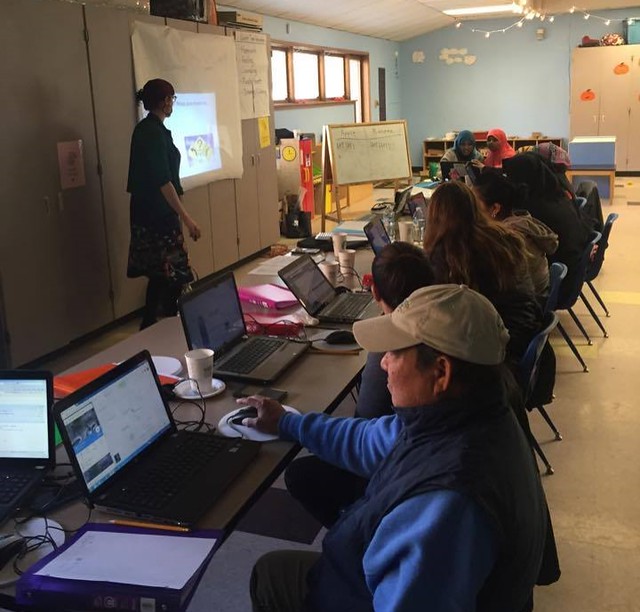
Story by Alia Marsha, The Seattle Globalist
Imagine how hard it would be to access information and resources if you didn’t have computer skills. Now imagine if, on top of that, you have just moved to a foreign country and were still learning the predominant language.
The goal for the Coalition for Refugees from Burma’s program “Nexus: Connecting Newcomers with Technology” is to remove those barriers for recently-arrived refugee and immigrant communities.
The Coalition for Refugees from Burma (CRB) has secured a grant from the City of Seattle through the Technology Matching Fund (TMF) for the third time to continue their computer literacy programs
When the CRB began in 2009 there was a larger community of refugees and immigrants from Burma in the Seattle area. Since then, though, a lot of them have moved to more affordable cities. According to the City’s Office of Immigrants and Refugee Affairs, as of October 2015, there are 261 refugees from Burma in Washington state. Five years prior, in 2010, there were almost 800 refugees from Burma in the state, according to data by the U.S. Department of State Refugee Processing Center.
Responding to the change, in 2016 CRB started to expand their computer literacy programs to serve all recently-arrived refugees and immigrants. CRB collaborated with partners like Seattle World School, Somali Youth and Family Club and the Seattle University Center for Service and Community Engagement to ensure its computer classes are linguistically and culturally relevant. It has also expanded its program to include immigrants and refugees in Kent.
According to Siobhan Whalen, a program manager at CRB, this past year in the Kent program alone, CRB served immigrants and refugees speaking over 13 languages from eight countries.
Rosa, an immigrant from Mexico who moved to Seattle in 2002, is one of those clients. Her son goes to Bailey Gatzert Elementary School, where the Seattle University Center for Service and Community Engagement hosts “Family Talk Time,” a program to help English Language Learner families get involved with conversations that happen at the school. This was also where the computer classes taught by CRB were held.
Rosa joined the program at the beginning of 2016. Because of the computer classes, Rosa now has a Gmail account. But there are many other tech skills she wants to learn this coming year.
“I want to know the other programs I have on my computer, use more of my fingers on the keyboard,” said Rosa.
The TMF award will also allow CRB to file paperwork to reduce monthly home internet costs for Rosa and others, from $45 to $10.
Whalen, who is also an instructor, said that the impact of those computer classes on immigrants and refugees is very immediate. “That’s part of technology, right? That immediate access to information, to opportunities, to resources,” she said.
Whalen recalls seeing that impact hit her inbox on a recent day, following one of the computer literacy classes at Bailey Gatzert. Students had just gone through a lesson on making an email account and practicing writing messages to each other.
After the class was over, Whalen opened her inbox to find an email from one of the parents in the class: “We really want more computer classes.”
“We just thought, how cool, that almost instantly that this parent felt empowered and had a platform for her voice to reach out to me and our partners at Seattle U. It was like full circle I think for myself and for the Seattle U folks — that advocacy piece,” said Whalen.
Learning technical skills is an important part of those classes, but Whalen says that the CRB is really interested in building confidence so that the communities they serve are able to advocate for themselves and their families.
